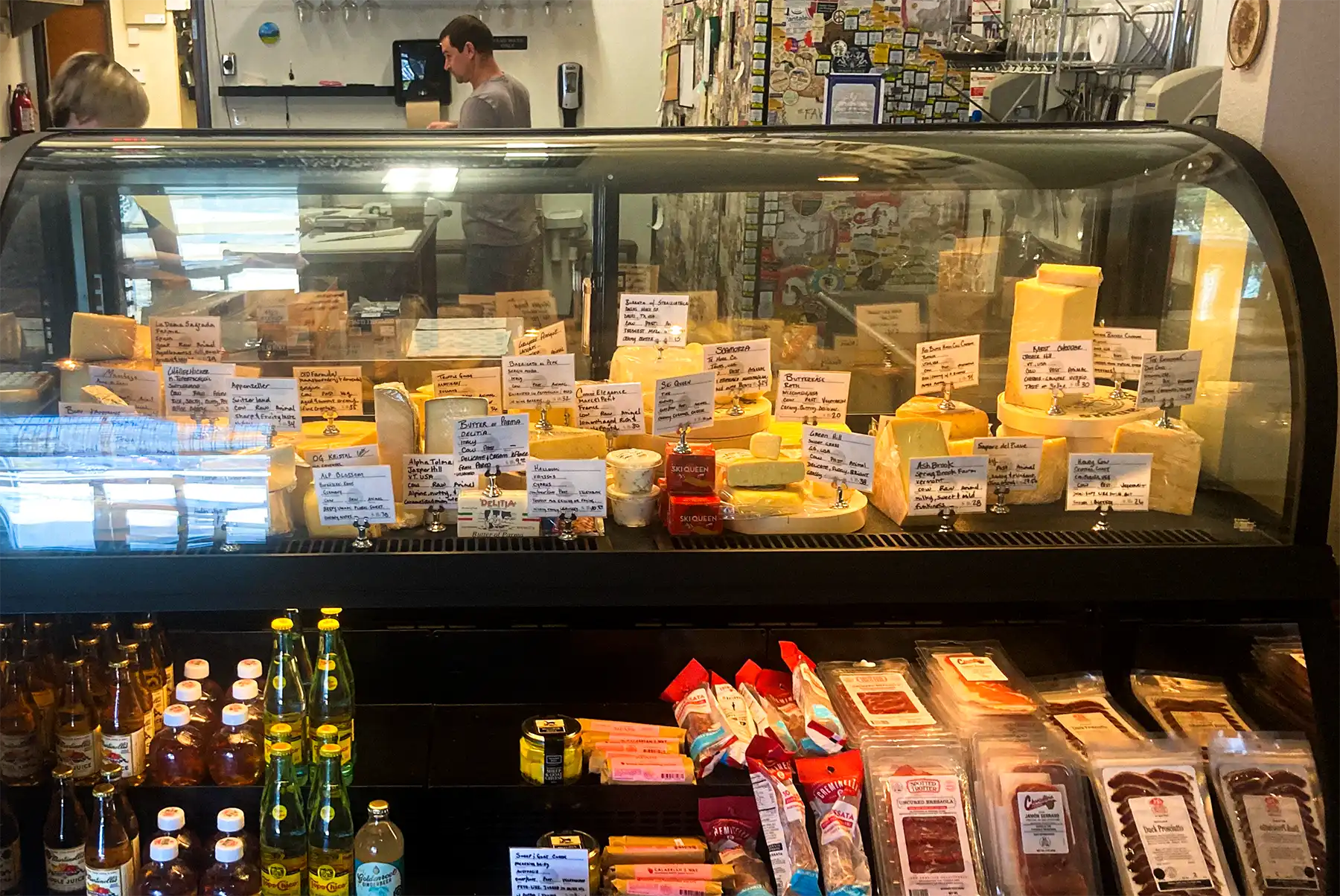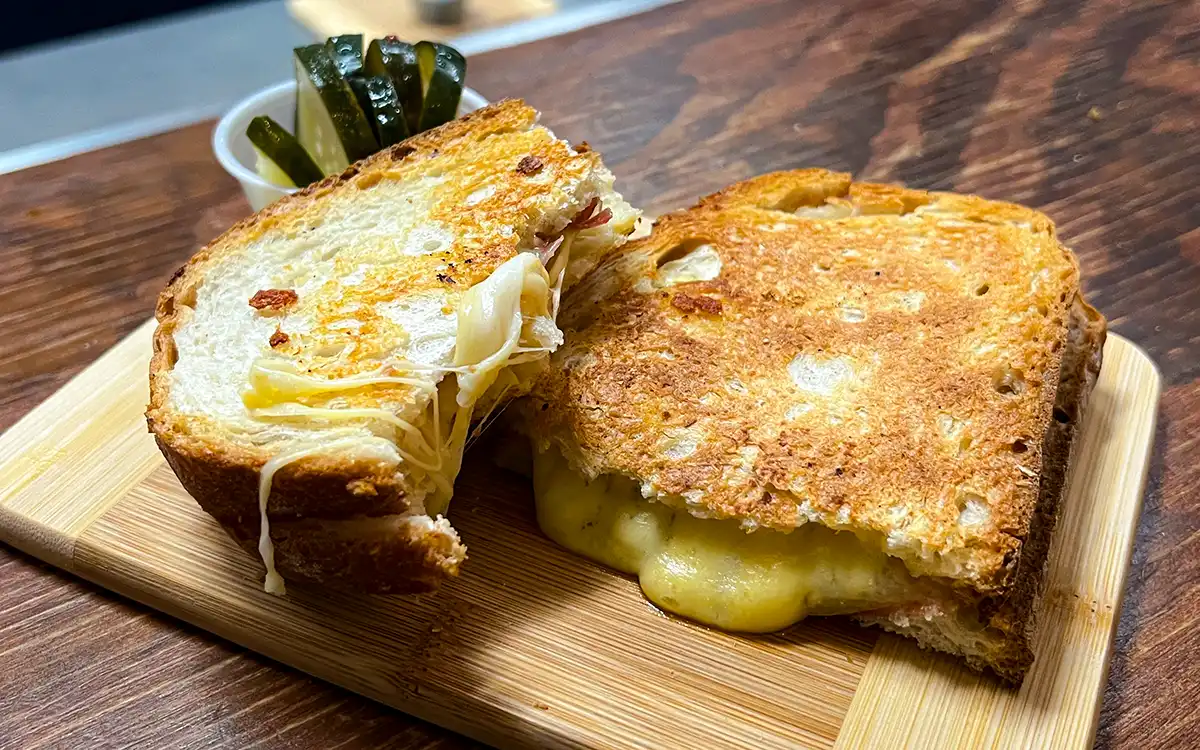Ten:One - The Godhead is in the Cheese

By Rob Curran
There’s a cosmology developed in medieval times by an Italian miller named Menocchio which holds that human life burst forth from the earth itself in the same way that worms can spring from a fermenting cheese.
I first met Justin Bonard 14 years ago. We were following the same path – the one on the verge of Locust Street near the North Branch Library, each strollering a toddler to the playground at Evers Park, where, true to the Murphy’s Law of parenthood, they would nod off to sleep as soon as we arrived, allowing us to shoot the literary shit while we waited for them to surface in the inevitable post-nap strop and refuse to play on the equipment or with each other. A playdate, they call these occasions.
Both Justin and I studied English literature in college; more unusually, we had both retained our faith in literature as a thing. There are books, I believe, that add up to something more than mere entertainment or even mere containers of ideas. These books have a pharmaceutical power to improve the individual mind and the world mind (in Spanish, the word “mundo” equates to the English “world” plus something like “all human experience,” and it’s this mundo/world that literature, I believe, helps to shape). Justin is also a Person of the Books in a near bookless world, and he pointed me towards Zen and the Art of Motorcycle Maintenance as one of those powerful books. Author Robert Pirsig argues that what he calls the “Godhead” can be found in manmade things. Pirsig found his godhead in the circuitry and spark plugs of motorcycle engines.
My friend Justin Bonard has found the godhead in the same place Menocchio found it: cheese, which he mongers in his artisanal shop Ten:One at 515 South Locust, a short walk from the square.
“Something else that comes up in that [Pirsig] book a lot is the pursuit of quality,” said Justin, when we reconnected at the store recently. “’What is quality? How do you find quality?’ I think that has a very, very broad application to how we want to live our lives. Whether you choose to take a walk for 20 minutes in the morning or look at social media for 20 minutes in the morning: where do we get quality in our lives? I’ve always derived a sense of good quality from good food and drink, and it’s made me happier.”
Bonard grew up in the Missouri Ozarks, where Bigfoot sightings exceed those of foodies. His parents were seekers, however, and had seen a lot more of the world than most of their friends and neighbors. Justin developed a taste for fresh baked bread, and this remains a passion – most days, before he comes to the shop, he calls into Ravelin Bakery just one street over.
“We’ve always been so lucky in this town. To have Ravelin… we take it for granted unless you go anywhere else, and then you realize other towns or even cities don’t have bakeries that good,” said Justin.
After college, Justin worked in food service around Denton and Dallas. He fell in love with cheese while he was head bartender at the legendary Hailey’s music venue. He had a tab at Hannah’s around the corner and got into boschetto al tartofo and other cheeses, experimenting with cheese pairings from the 50-strong Hailey’s beer selection.
His true birth as a foodie was at the Meddlesome Moth in Dallas, an influential gastropub in the Design District across the highway from Victory Park. He became one of the founding bartenders at Eastside. That’s where he was working when I met him in 2010. While Justin was at Eastside, beer was shifting in the U.S. from a utilitarian intoxicant to a hobbyist’s passion; He studied to be a cicerone, the beer equivalent of a sommelier (he also passed some of the qualifying exams to be a sommelier). It’s also where he met Anthony “Lanky” Langston, another one of Eastside’s earliest employees. If you don’t know the inimitable Lanky, stay tuned for future Hottest Plate editions.
The main difference between working as a barman with Lanky and working as a cheesemonger with Lanky, according to Justin: “It’s healthier in so many ways; we do drink earlier in the day, but -- so what -- if you have the first drink at 1 o’clock instead of 7 o’clock. We don’t drink as much.”
A bartender, and particularly one with a cicerone training, is more than a shop attendant. Most of my life coaches have been bartenders. Bartenders not only act as guides through the obscure world of beer flavours, they shepherd you through the hard times and circumvent bad decisions at vulnerable moments. Lanky and Justin – and the other cheesemongers at Ten:One, Andie Lotspiech and Christa Deason -- try to bring the same depth of relationship to their cheese customers as they did to the regulars at Eastside.
“We see the cheese shop as an extension of…being a bar,” said Justin.“We have the nicest, sweetest customers. They all have to have a little patience, they all have to try something new, they all have to trust us a little bit. Now most of them trust us a lot…we make our own pickles, we make our own mustard, make our own jam.”

Justin, Lanky and their cheesemates are still steering a willing public towards something they themselves get a buzz out of.
“We’re normalizing good cheese,” said Justin. “In Europe, a town the fraction of the size of Denton would have a cheese shop probably doing a lot more business than we are.”
My own introduction to fine cheeses was traumatic, and almost a dead end. A French friend gave me a smidgen of what Justin calls a “washed rind cheese,” a cheese that’s wrapped in a rind that has a culture of bacteria. One nibble and I felt like I had snorted Wasabi and fallen head-first into a septic tank. Florian had to sit me down on the couch, and serve me some fortified port wine to stave off the panic attack and the after taste. My nose bone smarted. My Parisienne sister-in-law Anne Caminade, cannot be in the same room as a refined dairy product, because her father stockpiled such cheeses in the family fridge like biological weapons.
Which is all to say: do not approach the world of cheese without an experienced guide.
For those that Justin inducts into the world of cheese – and I am one of that number, getting talked into purchasing a quarter-pound of Comté from Justin’s description: “it’s nutty brown, buttery and got sometimes a little bit of butterscotch tone, but also fruitiness and also a little bit onion” – noxiousness is not a factor. It’s a misconception that all good, complex cheese is of the sort that punches you in the nose bone and makes you sob. Texas is one of the world’s best spots for fresh goat cheese, which is soft, spreadable and positively fragrant. A nationally renowned cheesemaker from Flower Mound used to supply some of it to Ten:One (another North Texas dairy comes to deliver in person once a week.)
Plus, Justin pointed out that, unlike wine (and, to some extent beer, cos a sixer of Pliny the Elder will set you back $72), the vast majority of fine cheeses come in a range between $8 and $12 a generous serving (a quarter-pound does 90% of cheese buyers per store visit, Justin estimates).
Ten:One does sell washed-rind cheeses, but Justin provides customers trigger warnings. Tips for coping include sticking to the cheese flesh on the interior if the rind exterior proves overwhelmingly stinky. The shop tries to stock a little of every style, with cheddars, blue cheeses and even some buffalo cheese (as Justin noted, Mozzarella is a buffalo cheese, which is pretty weird if you think about it.)

The best time to visit Ten:One is right around lunchtime on grilled-cheese Wednesdays. The grilled cheese is one of the great American innovations. The first member of my family to get stateside brought it home from her New York sojourn. It blew our Irish minds. Cheese sandwiches, which I love, are a completely different animal to the melty deliciousness of a double-buttered, fried grilled cheese. The French have their croque monsieur – at times a superior dish – but, on average, lacking the glorious simplicity of the grilled cheese. The grilled cheese is not a dish that ever required “elevation.” In the wrong hands, the thing could fall apart during such a maneuver. Lanky and Justin are the rare chefs who are in touch with their pretension-free backgrounds and possess the authentic Pirsigian quality-focus to lift up the grilled cheese while keeping a melty string of connectedness with its earthy origins. Pow!
Justin finessed my question about the Denton food scene undergoing a coming-of-age moment. In hindsight, this may be because Justin is rooted so deep in that scene and that moment. When Justin and I met back in the early ‘tens, Denton was a college town, more of a smoky town than a foody one, in the sense that you could smoke in restaurants such as Sweetwater – now Desi Adda; but also in the sense that heavy-lidded munchies-seekers were among the most important patrons of other local favorites such as TJ’s and J&J’s. Rather than watching from the customer side of the bar like I was, Justin was busy being part of that change.
Denton has always been a good spot for food and drink, in Justin’s view, though he pinpoints 2007 as the year that things stepped up a notch.
“You can’t talk about Denton food without talking about Keiichi,” said Justin. “I think it was 2007 that Kei opened. We’re so lucky to have him, but the irony of him being so good at what he does is that we can’t get in!”
Justin has also seen the nation’s relationship to beer and cheese evolve. These days, when he goes back to visit Missouri, he drops in on a dairy near Kansas City. Green Dirt Farms has become one of Ten:One’s top suppliers.
As for the pandemic, Justin joked: “Everybody else said: ‘I’m broke and stressed,’ we were like, ‘we’ve been open for a year so we’re broke and stressed every day.”
Also, a cheesemonger is more naturally suited to grab-and-go mask-wearing eras. Not even the Black Death slowed the European cheese boom.
One of Justin’s annual events is called “Beer Vs Wine.” The next edition is at partner restaurant the Chestnut Tree on Sunday, March 24. For this Justin gives a group of local food-service pros a list of cheeses and invites them to come up with beer or wines that would pair best. Another Denton event, happening in early April, is a beer-n-cheese crawl.
One last question continues to burn. Where did that name come from? It’s a question that your fearless correspondent was definitely maybe getting around to before it burned the whole enterprise down, but apparently was getting there far too slowly for a South African cheese connoisseur who inserted herself into the interview to ask it:
It takes ten pounds of milk to make one pound of cheese, apparently. Hey, yo, Cape Town, way to show a guy up with the best question of the day.
The name has another meaning for me. If Justin had asked me, back in ’10 when we were hanging at the playground, I would have given him ten-to-one for a cheese shop to make it in Denton. Now he’s talking about opening a second location.

